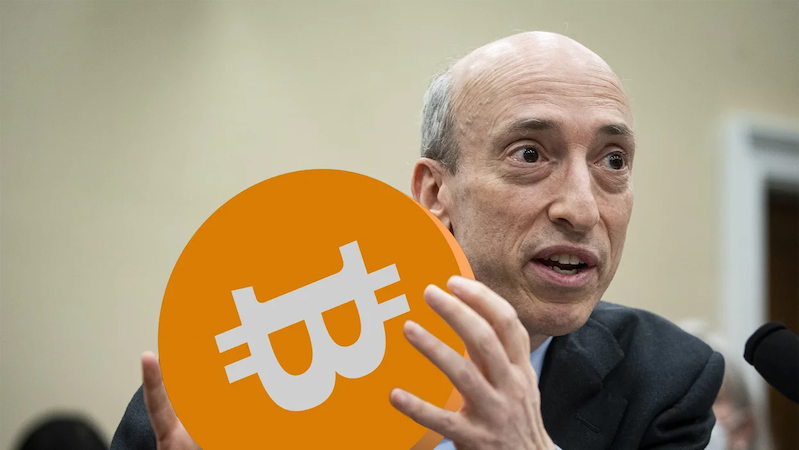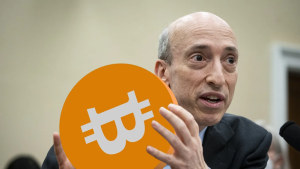Join Our Telegram channel to stay up to date on breaking news coverage
The Atlanta Fed is now holding its 27th annual Financial Markets Conference with the topic “Old Challenges in New Clothes.” Gary Gensler, chairman of the Securities and Exchange Commission, and other well-known financial figures, as well as other participants in the digital economy, were among the speakers.
Gensler, vehemently refuted charges that the SEC has not provided helpful counsel for crypto companies trying to remain in compliance with federal law during a keynote speech on Monday by asserting that “the rules have already been published.”
Gary’s speech barely mentioned the market for digital assets, but moderator Tom Barkin, president and chief executive officer of the Federal Reserve Bank of Richmond, brought up the issue by inquiring about the SEC’s on-going legal battle with Coinbase and whether Gensler believed the agency had lagged on cryptocurrency enforcement.
Gensler said he doesn’t believe the SEC is out of date, citing the 140 cases the agency has brought up over the years, before briefly discussing Satoshi Nakamoto and the intriguing field created by his creativity. But he didn’t take long to warn the populace of how bitcoin businesses are creating dubious business models.
The idea that they are decentralized is untrue, he claimed. You can locate a website and a group of entrepreneurs around the majority of these, and they tend to centralize. His statement was followed by the statement that
Their business models tend to be built on taking customer funds and commingling them.
The bitcoin industry has criticized the SEC recently and in years past for not establishing clear or novel laws.
When questioned about the cryptocurrency industry’s recurring demand for clearer laws, the regulator appeared a little annoyed but insisted that “there is nothing about a new technology that makes it non-consistent with public policies”—reiterating what he said in a congressional hearing earlier this year.
Referencing past statements, Gensler claimed the analogy is clear for cryptocurrency companies storing what they consider securities on their platform: they too need to abide by the regulations. He specifically mentioned financial intermediaries in traditional money markets like rent-collecting-nodes.
Coinbase sues for lack of clarity
Contrary to these statements, Coinbase, one of the most prominent cryptocurrency exchanges, filed a lawsuit against the SEC in an effort to get the regulatory position of the cryptocurrency business clarified.
In a specific request to the regulatory body, Coinbase requested that the agency make its response to a petition that was submitted months ago public. In the petition, it was questioned whether the Securities and Exchange Commission (SEC) would approve the regulation of the cryptocurrency market utilizing the SEC’s existing regulatory frameworks.
The exchange claimed that the SEC seemed to be eroding its own authority as a watchdog over businesses that apply to offer shares to the general public. Coinbase asserted that the SEC would have stopped the S-1 document from going into force and safeguarded the investing public if it had thought Coinbase’s primary operations breached securities law.
Due to Coinbase‘s legal action, the debate surrounding cryptocurrency regulation went to the public eye, leading many experts to call for greater clarity and consistency in how the government regulates the industry.
Other crypto entities criticize SEC
Gary Gensler also came under fire in April from Brad Garlinghouse, CEO of Ripple, for saying that he has the authority to decide which cryptocurrency tokens are securities rather than relying on the regulations that govern his agency’s authority. The chief executive officer of Ripple stressed that “elected officials in the United States ought to pay note.”
In an April tweet, he said:
It is incomprehensible that the SEC Chair would claim that he, and not the laws from which his agency draws its authority, determines what constitutes a security. It’s time for American elected officials to pay attention.
The SEC has been criticized for attacking viciously many established crypto businesses in the last couple of months, among them Binance, Coinbase, Bittrex and Ripple. The operation had been labeled “Operation Choke Point 2.0“.
Gensler retorts
According to Gensler, however, if conforming to regulations proves to be too challenging, the agency “stands ready to help them to come into compliance.”
And yet, since there is “no way to register” with the SEC, according to the SEC’s own crypto-friendly commissioner Hester Peirce, critics of the agency have labeled such offerings deceptive. The same thing has been asserted by Republican senators who claim Gensler’s “push for firms to ‘come in and register’ is a willful misrepresentation of the SEC’s non-existent registration process.” These critics assert that the SEC is behind the times and is on a misguided mission to drive crypto innovation out of the United States.
The European Union has been working hard to introduce a new set of regulations for the cryptocurrency industry, despite American authorities like Gensler insisting that the current standards are sufficient.
Related
- SEC accuses Bittrex of conducting unregistered business
- U.S. Congress to Address SEC Oversight and Legislation Regarding Stablecoins
- Coinbase and the SEC
- Operation Choke Point 2.0: US goes after crypto amid confusion and uncertainty
Best Wallet - Diversify Your Crypto Portfolio
- Easy to Use, Feature-Driven Crypto Wallet
- Get Early Access to Upcoming Token ICOs
- Multi-Chain, Multi-Wallet, Non-Custodial
- Now On App Store, Google Play
- Stake To Earn Native Token $BEST
- 250,000+ Monthly Active Users
Join Our Telegram channel to stay up to date on breaking news coverage


